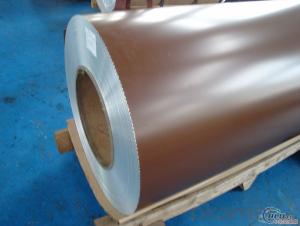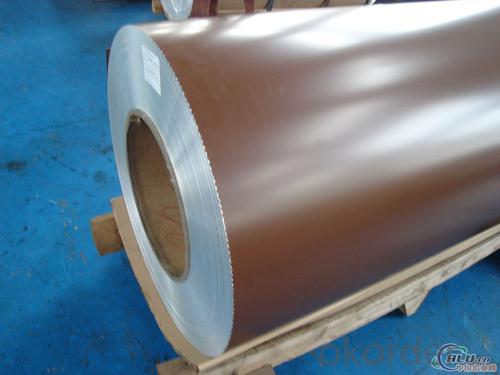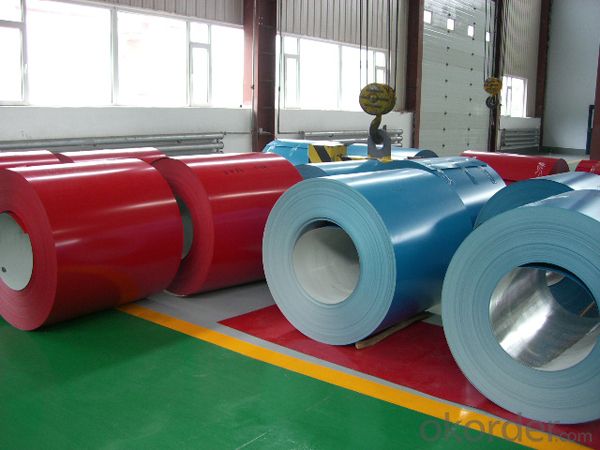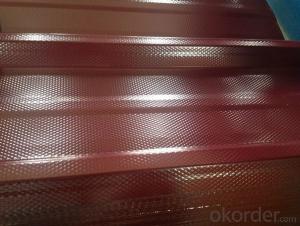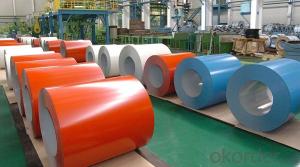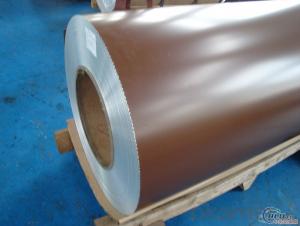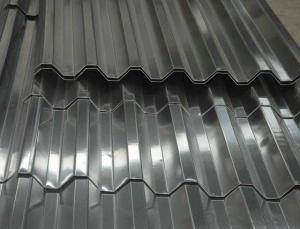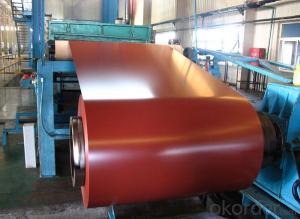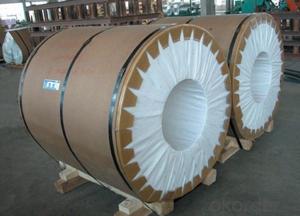Wide Aluminum Roof Coil - Color Coating Aluminum Coil 3003 for Decoration
- Loading Port:
- Shanghai
- Payment Terms:
- TT OR LC
- Min Order Qty:
- 5 m.t.
- Supply Capability:
- 10000 m.t./month
OKorder Service Pledge
OKorder Financial Service
You Might Also Like
Specification
1. Specification of Color Coating Aluminum Coil 3003 for Decoration
Material | Alloy Aluminum 6063,6061,6005 or customer nominated |
Temper | T3, T4, T5, T6 |
Surface | Anodize, electrophoresis, powder coating, PVDF coating, wood grain painting, matted, etc. |
Colour | Any colour based on Standard Germany RAL Mark |
Length | Coating 6.5 meters, Anodizing 6.5 meters, Mill finish 5 meters |
Press Machine | 500-4000 tons all together 64 press lines. |
Fabrication | 1. Windows and doors; 2. Drilling; 3. Bending; 4. Cutting; 5. etc. |
Certificate | ISO 9001 |
Moulding | 1. Using our moulds, no fee; |
2. Using customer drawing, opening mould, usually about 10~50 tons then the moulding can be refunded. | |
3. Mould cost is negotiable base on the order quantity | |
Capability | Annual output 100,000 tons |
2. Application of Color Coating Aluminum Coil 3003 for Decoration
(1).Interior: wall cladding, ceilings, bathrooms, kitchens and balconies, shutters, doors...
(2).Exterior: wall cladding, facades, roofing, canopies, tunnels,column covers , renovations...
(3).Advertisement: display platforms, signboards, fascia, shop fronts...
3. Feature of Color Coating Aluminum Coil 3003 for Decoration
*Such coil is specially designed to replace aluminum ingot, due to the high export tax of aluminum ingot, the coil has better price than ingot.
*This type of coil can fit customer's remelting furnace just like ingot, no need to make any change to the production line that was previously used for ingot. The standard coil size and weight is very suitable for the feed gate of furnace.
*This type of coil causes less material wastage than ingot when remelted.
*Our coil is made directly from ore, no need to go though the ingot making process, quality is much better than other suppliers who use ingot scrap to make coil.
Be free from Oil Stain, Dent, Inclusion, Scratches, Stain, Oxide Dicoloration, Breaks, Corrosion, Roll Marks, Dirt Streaks and other defect which will interfere with use
4. Certificate:
SGS and ROHS(if client request, paid by client), MTC(plant provided), Certificate of Origin(FORM A, FORM E, CO), Bureau Veritas and SGS (if client request, paid by client), CIQS certificate
5. Image of Color Coating Aluminum Coil 3003 for Decoration
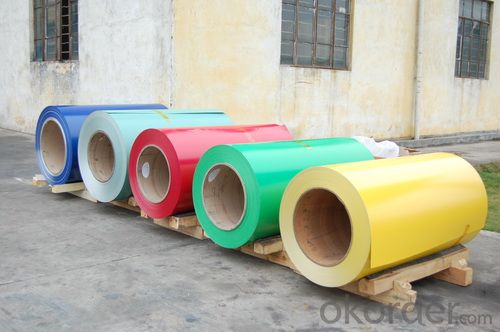
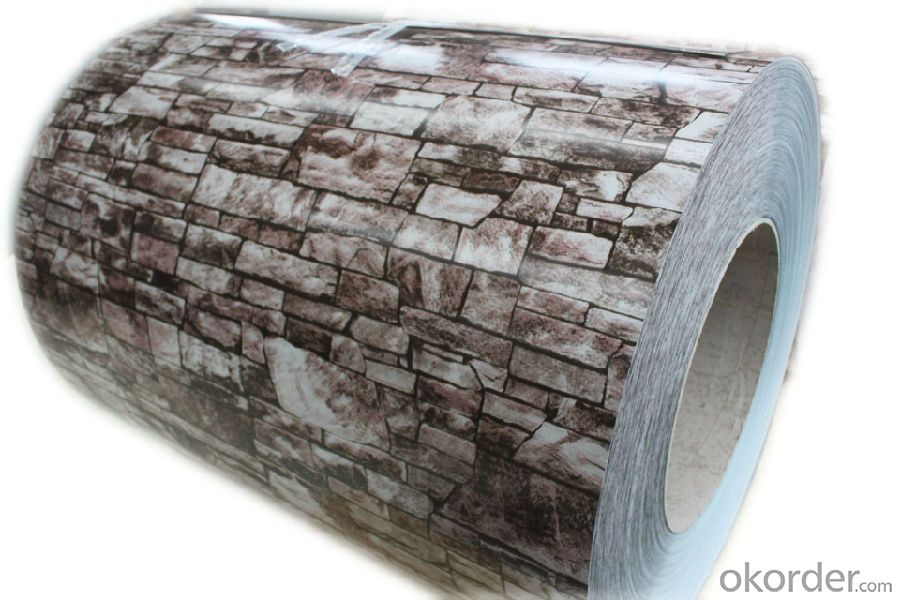
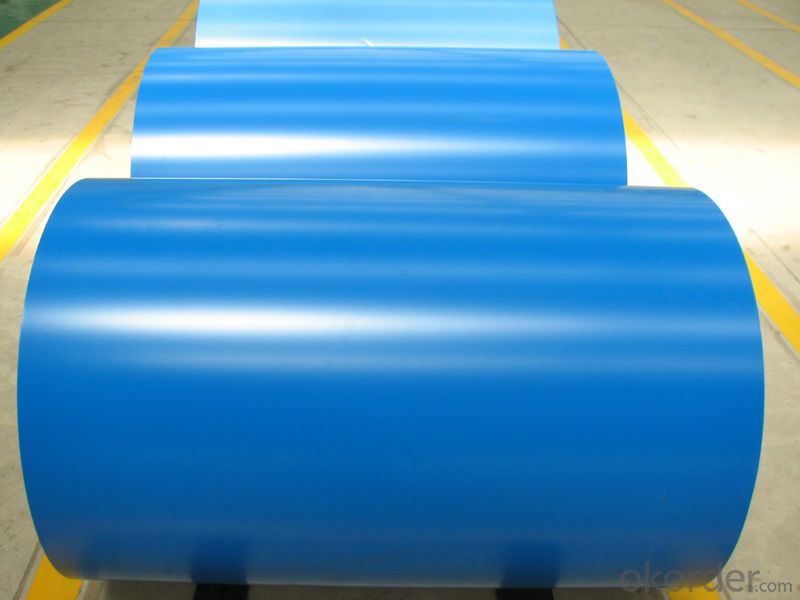
6. Package and shipping of Color Coating Aluminum Coil 3003 for Decoration
eye to wall
eye to the wall
with wood pallet (wooded case also available)
7. FAQ
1) What is the delivery time?
Dpends on actual order, around 20 to 35 days
2)What is the QC system:
We have QC staff of 20 persons and advanced equipment, each production is with MTC traced from Aluminum ingot lot.
3) What market do you mainly sell to?
Australia, America, Asia, Middle East, Western Europe, Africa etc
- Q: What are the different edge profiles available for aluminum coils?
- There are several different edge profiles available for aluminum coils, including square edge, round edge, and beveled edge. These profiles provide different levels of protection and aesthetics, allowing for customization based on specific application requirements.
- Q: What precautions should be taken while using tools for handling aluminum coils?
- <p>When handling aluminum coil tools, it's crucial to follow safety measures to prevent accidents. Always wear appropriate personal protective equipment (PPE) such as gloves, safety glasses, and closed-toe shoes. Ensure the tools are in good condition and well-maintained. Keep the work area clean and free of debris to avoid slips or trips. Be cautious of sharp edges on the aluminum coils, as they can cause cuts. Use lifting equipment when necessary and never attempt to lift heavy coils manually. Follow all manufacturer guidelines for the safe operation of the tools. Regularly inspect the tools for any signs of wear or damage and replace them as needed.</p>
- Q: Explain how aluminum coils function to shield against electromagnetic interference.
- <p>Aluminum coils protect against electromagnetic interference (EMI) through a process known as electromagnetic shielding. Aluminum, being a conductive material, can reflect and absorb EMI, preventing it from penetrating the protected area. When an aluminum coil is used as a shield, it creates an electric field that interacts with the EMI, either reflecting the interference back or absorbing it, thus reducing its impact on sensitive electronic equipment. The high conductivity of aluminum also allows it to distribute the EMI evenly across its surface, minimizing the effect of any single point of entry. This shielding is crucial in various applications, such as in electronic devices and communication systems, to ensure reliable performance and data integrity.</p>
- Q: What are the steps to properly store an unused aluminum coil to prevent it from rusting?
- <p>To store an unused aluminum coil and prevent rusting, follow these steps: 1. Clean the coil thoroughly to remove any dirt or moisture. 2. Apply a thin layer of a rust inhibitor or light oil to the surface. 3. Wrap the coil in a protective plastic or wax paper to prevent moisture and air exposure. 4. Store the coil in a cool, dry place away from direct sunlight and humidity. 5. Ensure the storage area is well-ventilated to prevent condensation. 6. Periodically check the coil for any signs of rust and clean if necessary. By following these steps, you can effectively prevent rusting and maintain the quality of the aluminum coil.</p>
- Q: What are the different coil slitting methods used for aluminum coils?
- Aluminum coils can be slit using various methods, each offering distinct advantages and applications. Here are a few commonly used techniques: 1. Rotary Shear Slitting: Employing rotating circular knives, this method achieves precise and speedy cutting of aluminum coils into narrower strips. It is ideal for high-volume production of consistently sized narrow strips. 2. Loop Slitting: This method involves passing the aluminum coil through a loop, where rotating knives make the cuts. Loop slitting enables fast processing while minimizing the risk of surface damage, making it suitable for thinner gauge coils. 3. Double Knife Slitting: Using two blades, this technique makes parallel cuts along the length of the aluminum coil. It is best suited for thicker gauge coils and can produce wider strips compared to other methods. 4. Scissors Slitting: This versatile method deploys a pair of scissors-like blades to cut the aluminum coil into strips. It can handle a wide range of coil thicknesses and is commonly used in smaller scale operations or when precise width tolerances are not critical. 5. Crush Slitting: Here, the aluminum coil is pressed against a hardened roller or blade, causing it to deform and rupture along the desired cutting line. Crush slitting is ideal for delicate materials or when minimal burr formation is desired. Each slitting method has its own advantages and limitations, and the choice depends on factors such as coil thickness, desired strip width, production volume, and surface quality requirements. Selecting the appropriate method is crucial for efficient and accurate slitting of aluminum coils.
- Q: How to identify the quality of color coated aluminum coil and sheet?
- Color coated aluminum coil is a kind of aluminum coil. As for qualified color coated aluminum coil, the surface has no impression, holiday and damage through the coating, and also no ripple, scratch and swell. All these are easy to see. However, the most important is the color difference of the color coated aluminum coil which is not obvious but will influence the decoration effect. Now the surface of curtain wall aluminum sheet will also be treated with electrostatic spraying. The power coating materials can have dozens of colors and realize good decorative effect, with polyurethane, polyethylene expansion resin and epoxy resin as raw materials, high color retention pigment as auxiliaries.
- Q: Can aluminum coils be used in high-altitude environments?
- Yes, aluminum coils can be used in high-altitude environments. Aluminum is a lightweight and corrosion-resistant material, making it suitable for various applications, including in high-altitude environments. Aluminum coils are commonly used in air conditioning systems, heat exchangers, and refrigeration units, which can function efficiently at high altitudes. Aluminum's high strength-to-weight ratio allows it to withstand the extreme conditions found at high altitudes, including low temperatures, high winds, and low atmospheric pressure. Additionally, aluminum is non-magnetic, which is advantageous in certain high-altitude applications, such as aerospace and satellite technologies. Furthermore, aluminum has excellent thermal conductivity, allowing it to efficiently transfer heat, making it ideal for use in cooling systems operating in high-altitude environments. Its corrosion resistance properties also make it durable and able to withstand the effects of moisture, which can be prevalent in such environments. Overall, aluminum coils are a reliable and suitable choice for use in high-altitude environments due to their lightweight, corrosion resistance, thermal conductivity, and strength.
- Q: What is the typical yield strength-to-density ratio for aluminum coils?
- The typical yield strength-to-density ratio for aluminum coils can vary depending on the specific grade of aluminum being used. However, in general, aluminum has a relatively high strength-to-density ratio compared to many other metals. This means that it can provide good mechanical properties while still being lightweight. For example, the most commonly used grade of aluminum for coils, 3003 aluminum, typically has a yield strength-to-density ratio of around 0.53 MPa•m^3/kg. This means that for every unit of density (mass per unit volume), the material can withstand approximately 0.53 megapascals (MPa) of stress before it starts to deform permanently. Other high-strength aluminum alloys, such as 5052 or 6061, can have even higher yield strength-to-density ratios, reaching up to 0.6 MPa•m^3/kg or more. These alloys are often used in applications where higher strength and durability are required, such as in aerospace or automotive industries. Overall, the yield strength-to-density ratio of aluminum coils is typically quite favorable, making aluminum a popular choice for a wide range of applications that require both strength and lightweight properties.
- Q: What benefits can be gained from utilizing aluminum coil insulation in various applications?
- <p>Aluminum coil insulation offers several advantages, including high thermal conductivity, which allows for efficient heat transfer. It is lightweight and corrosion-resistant, making it durable and suitable for various environments. The material is also known for its flexibility, which facilitates easy installation and adaptability to different shapes and sizes. Additionally, aluminum coil insulation has good electrical conductivity, which can be beneficial in applications requiring electromagnetic shielding. Its recyclability contributes to environmental sustainability, reducing waste and promoting green practices.</p>
- Q: Can aluminum coils be formed into different shapes?
- Yes, aluminum coils can be formed into different shapes. Aluminum is a highly malleable metal, which means it can easily be bent, shaped, and formed without breaking. This property makes it an ideal material for various applications where flexibility and versatility are required. Aluminum coils can be formed into different shapes using a variety of techniques, such as bending, rolling, stamping, extrusion, or even by using specialized machinery like a coil forming machine. These processes allow the aluminum coils to be transformed into a wide range of shapes, including sheets, plates, tubes, wires, or complex three-dimensional forms. The ability to form aluminum coils into different shapes makes it an excellent choice for industries such as construction, automotive, aerospace, and manufacturing, where customized parts and components are often needed.
Send your message to us
Wide Aluminum Roof Coil - Color Coating Aluminum Coil 3003 for Decoration
- Loading Port:
- Shanghai
- Payment Terms:
- TT OR LC
- Min Order Qty:
- 5 m.t.
- Supply Capability:
- 10000 m.t./month
OKorder Service Pledge
OKorder Financial Service
Similar products
Hot products
Hot Searches
Related keywords
